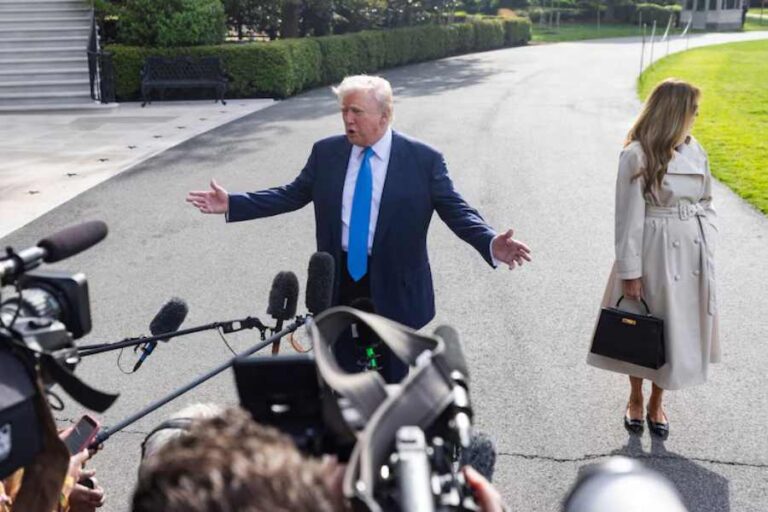WASHINGTON — President Donald Trump claimed he has already secured “200 deals” related to tariffs and outlined ongoing discussions with Chinese President Xi Jinping during a wide-ranging interview with Time magazine published Friday. The interview, centered around Trump’s first 100 days in office, touched on several major policy areas, including trade negotiations, immigration enforcement, and the ongoing conflict between Russia and Ukraine.
Trade Talks and China Relations
Pressed on White House trade adviser Peter Navarro’s prediction of “90 deals in 90 days,” Trump insisted the number was even higher.
“I’ve made 200 deals,” Trump said, confirming the figure when asked by the Time interviewer. However, he declined to provide specific details about which countries were involved or the terms of these alleged agreements.
Trump further projected optimism about wrapping up trade negotiations soon, stating, “I would say, over the next three to four weeks, and we’re finished, by the way. We’ll be finished.”
When asked about China — a key player facing significant tariffs under Trump’s policies — the president revealed that Chinese President Xi Jinping had called him.
“He’s called. And I don’t think that’s a sign of weakness on his behalf,” Trump said.
Despite Trump’s comments, Chinese officials quickly disputed claims of active discussions. On Thursday, Chinese Foreign Ministry spokesperson Guo Jiakun dismissed the White House’s statements as “fake news,” and reiterated on Friday that “China and the United States have not consulted or negotiated on the tariff issue.” Jiakun further urged the U.S. “not to confuse the public.”
When questioned by reporters outside the White House on Friday, Trump refused to elaborate on the specifics of his communication with Xi. “I don’t want to comment on that, but I’ve spoken to him many times,” Trump said, sidestepping the question.
Deportation Policy and the Kilmar Abrego Garcia Case
The interview also shed new light on Trump’s controversial deportation policies. According to Time, the administration’s initiative to deport migrants to El Salvador, specifically its notorious CECOT prison, began in mid-2024 after an invitation from Salvadoran President Nayib Bukele. Florida congressman Matt Gaetz reportedly proposed the idea to Trump adviser Stephen Miller, who then brought it to Trump’s attention. A quiet agreement was ultimately reached earlier this year.
Trump expressed strong support for the plan, believing it would serve as a “greater deterrent” to illegal immigration.
Additionally, Trump addressed the high-profile deportation of Kilmar Abrego Garcia under the Alien Enemies Act. Initially, Trump admitted he was “not happy” about the deportation, believing it was a mistake. However, he later claimed Abrego Garcia was a member of the MS-13 gang — a charge the individual’s family and attorney strongly deny.
Although the U.S. Supreme Court had ordered the administration to facilitate Abrego Garcia’s return for due process, Trump said he has not requested Bukele to send him back. When asked whether Abrego Garcia deserved his day in court, Trump deferred responsibility to the Justice Department but ultimately stated it “wouldn’t bother” him if a new trial occurred.
“That’s not my determination,” Trump said. “Frankly, bringing him back and retrying him wouldn’t bother me, but I leave that up to my lawyer.”
Views on the Russia-Ukraine War
Addressing the Russia-Ukraine conflict, Trump once again placed blame on Kyiv, accusing Ukraine’s aspiration to join NATO of provoking Russia’s full-scale invasion. This stance contrasts sharply with the international consensus that Russia initiated an unprovoked war.
Despite growing speculation that the U.S. could withdraw support from peace negotiations, Trump conveyed optimism about a potential deal.
“We’ve had very good talks, and we’re getting very close to a deal,” Trump said.
Sources indicate that the framework for a potential settlement could involve conceding approximately 20% of Ukraine’s territory to Russia, including the contested Crimean Peninsula, which Trump asserted would “stay with Russia.”
When questioned about his oft-repeated claim that he could end the war “on Day 1” of his presidency, Trump backtracked slightly, suggesting the comment was meant figuratively rather than literally.
“Obviously, people know that when I said that, it was said in jest, but it was also said that it will be ended,” Trump said, acknowledging he had used “exaggeration” to make a political point.
What’s Next?
As Trump marks his first 100 days back in office, his bold claims on trade, immigration, and foreign policy reflect a presidency that remains as assertive — and controversial — as ever. However, with China’s denial of trade negotiations, legal challenges around immigration enforcement, and unsettled dynamics in Eastern Europe, Trump’s assurances of swift resolutions face significant skepticism at home and abroad.
Voters and global leaders alike are now watching closely to see whether the promises made in interviews will translate into tangible outcomes in the coming months.
